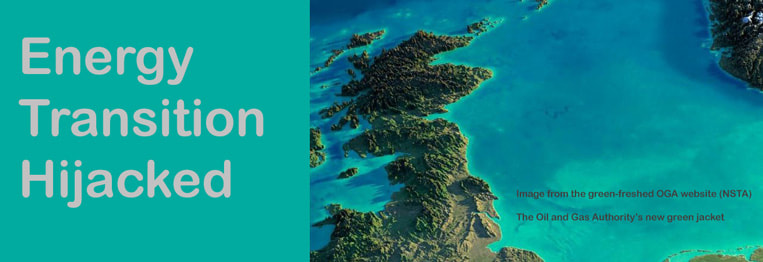|
In the oil industry hub Aberdeen, business as usual prevails: oil and gas are core. Myths of riches are created, hardship and poverty tolerated and the belief shared that oil is essential for life: our industry serves the greater good.
When government regulator The Oil and Gas Authority (OGA) yesterday rebranded itself to “North Sea Transition Authority”[i] all was normal – the oil industry is surely doing the right thing, organising the energy transition, working towards the Paris climate goals. But all is not well. The 1.5 degree carbon budget is expected to be burned up by 2029[ii], Oil and Gas companies are not working towards Paris compliance[iii], and the transition has barely started. Greenwash: Enemy of Transition This particular greenwash is important: by claiming the “Transition” concept ever further, the oil and gas industry marches rough-shod over Aberdeen’s current, and everyone’s future livelihoods. Climate Change and Just Transition are on one side, the Oil and Gas industry on the other: they’re at odds, both by law and by incentives. The Transition is not about turning oil companies into green oil companies. They can “harvest” the cash, or they can invest green – that’s between them and their shareholders[iii]. It’s only money. The Transition is changing society to bring emissions rapidly down to zero. This means changing: the way we transport ourselves and our things[iv] and warm our homes and offices[v], from where we get our energy[vi], how we build and make stuff, and much more. Transition is complex, connected, and often engineering. Transition is important: our lives depend upon it, not just our livelihoods. If we don’t phase out fossil fuel emissions fast, there’s little hope for much of humanity[vii]. The OGA (now NSTA) by contrast, has a legal remit to extend (oil industry) profits through Maximum Economic Recovery (MER). To make that happen, it cannot wind down the industry while there’s something producible left, hence their mantra “you can’t rush this transition”. Yet despite suggestions of commitment[viii], the OGA has no remit to support the government’s net zero aims[ix]. What Helps the Transition? The quickest road to remove fossil fuel emissions without excessive fall-out is what’s needed. By implementing (mainly existing) technology with clear short-, medium- and long-term targets this can be done: focus on what needs to be achieved and how, and jobs will come. The government must regulate for this, and there are many tools available to do so - if they wish. What Hinders the Transition? The oil and gas industry has no incentive to reduce fossil fuel extraction, to lose the staff-pool and skills, or to allow alternative industries and jobs to grow. They do have incentives to slow down any transition, promote false solutions which increase gas extraction (such as blue hydrogen), and sell more fossil fuels for longer. They also have extraordinarily well-connected lobbyists and organisations in and around government to achieve this. The rebranding of the OGA followed the rebranding of the oil and gas industry representative OGUK (Oil and Gas UK) to OEUK (Offshore Energy UK) a few weeks ago, and the rebranding of the OGTC (Oil and Gas Technology Centre) to the Net-Zero-TC last year. They still all do the same things: pursue MER and funnel public funds towards oil and gas companies. With this change they can now use “Net Zero” funding channels, and sound much greener. Oil and gas companies themselves are similarly on a grand green-wash offensive[x] – the transition and the climate are being hijacked with a truly massive green brush. The official line for rebranding the OGA is inclusion of offshore wind, as if the complete transition of our fossil fuel society and its workers will be achieved by offshore wind alone. That would indeed be so much easier than the real thing. The timing coincides with Climate Week North East[xi], an annual event series bringing climate change awareness to the region. That’s just coincidence – the OGA’s support for climate action is legally limited to its new green veil. # Notes and References [i] Energy Voice [https://www.energyvoice.com/oilandgas/north-sea/396680/reaction-oga-nsta-rebrand/] [ii] DNV 2021 Energy Transition Outlook https://eto.dnv.com/2021/about-energy-transition-outlook [iii] Carbontracker: Absolute Impact: Why oil and gas ‘net zero’ ambitions are not enough https://carbontracker.org/reports/absolute-impact-2021/ [iv] (modal shifts to public, active and green transport) [v] (insulation, heat pumps) [vi] (solar, wind, hydro, geothermal, tidal, wave, bio, etc) [vii] IPCC 6th Assessment Report (AR6): The Physical Science Basis. https://www.ipcc.ch/assessment-report/ar6/ [viii] https://www.nstauthority.co.uk/the-move-to-net-zero/ [ix] See section “Implementation of the Checkpoint” of this recent UK government consultation https://www.gov.uk/government/news/uk-government-seeks-views-on-new-oil-and-gas-climate-checkpoint [x] The Ferret, “BP targeting Scots with 'greenwashing' Facebook adverts” via https://www.facebook.com/theferret.scot/posts/3233672536954427 accessed 22/3/22 [xi] https://climateweeknortheast.org/
0 Comments
Your comment will be posted after it is approved.
Leave a Reply. |
AuthorWrite something about yourself. No need to be fancy, just an overview. Archives
March 2022
Categories |

 RSS Feed
RSS Feed